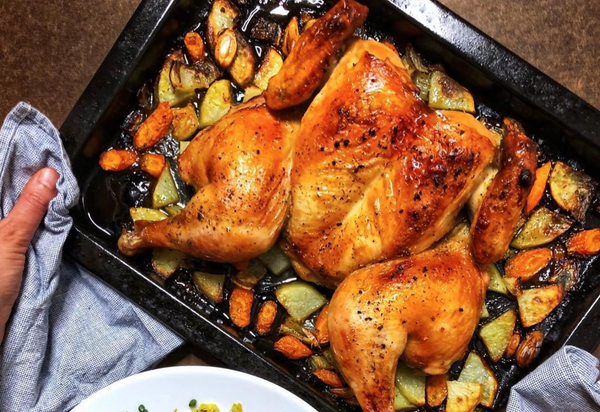Unless you have a knack for cooking, you're probably like almost every college student-- scared by the notion of not relying on takeout or parents for home-style meals. If you've just started cooking or will in the future, here a few things you need to know in order to survive.
1. You will fail.
As a novice cook, you will overcook, undercook, dry out, set on fire, and butcher many dishes. Cooking can't be taught with only a textbook. As a famous individual once said, "If at first you don't succeed, try try again." It's going to take a few times to understand the finesse of cooking pasta in boiling water, and what better way to learn than to try?
2. Everything looks hard until you try it.
If you don't try a recipe because it looks too hard, you'll never be able to understand what's so hard about it. You'll look at some of the recipes and see their giant list of ingredients, but if you really look into it, it's not terribly hard. If you follow directions (something that's been hammered into us since day school), you can really achieve anything (except maybe a Baked Alaska).
3. Stir fry and soups will be your everyday go-to.
If you don't always have a fully stocked fridge, stir fry and soup are things you can make with pretty much any ingredient. Conveniently, these two dishes are really really easy, quick, and hard to mess up. For easy stir fry, all you need is to chuck a few vegetables into a pan and douse with simple sauce like soy or teriyaki.
4. Shopping for ingredients is like being in a foreign country.
Did you know there are at least 11 types of onions? Every single one has a unique flavor and look. Make sure to do your research before going to the vegetable section of your local grocery store because it's pretty much impossible to hunt down an employee. You'll be stuck standing, looking clueless while hundreds of middle aged moms pass by you, hunting down their needed ingredients at full speed.
5. It's a healthier, cheaper option than takeout.
To make one pot of stir fry, it would cost you about $8, including the sauce (I'm imagining a "greens mix" with broccoli and cauliflower, mushrooms, and sauce). This a much healthier alternative than buying a soda, fries, and burger at In-N-Out for around the same price. You will probably have leftovers as well! The great thing about cooking at home is that budgeting is much easier than when you eat out. You can buy groceries and make multiple dishes and meals for your entire week.
6. Make sure to learn what can be recycled, composted, and put in the trash.
Since you're now (hopefully) going to be a regular consumer of home cooked meals, you will also be regularly figuring out where to throw out your meat packaging and vegetable leftovers. If you're confused, don't throw everything out into the trash. Create a compost for your vegetables and a recycling bin for your paper and plastic. You'll not only be helping yourself with healthier food, but also helping the Earth one meal at a time.
It's obvious to see that eating a bowl of homemade pasta is much better, nutritionally and economically, than instant ramen. Whether it means cooking in your dorm's microwave or in your kitchen's apartment, step out of your comfort zone and take a chance to enhance not only your health, but also another necessary life skill. If you find you're absolutely atrocious, don't give up. Worst Cooks of America is always looking for new contestants!





















